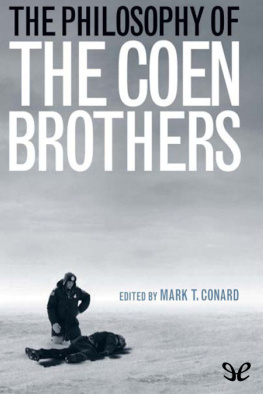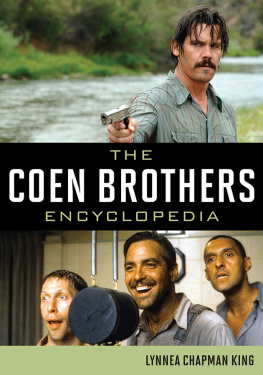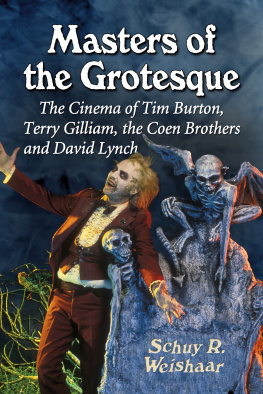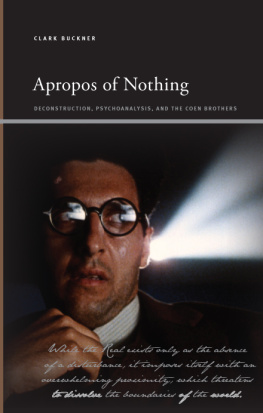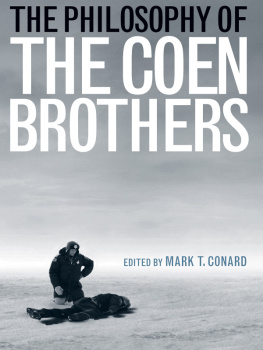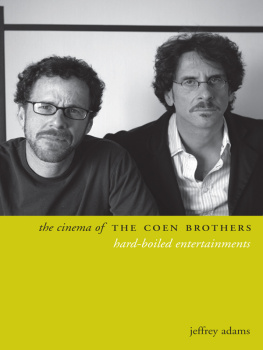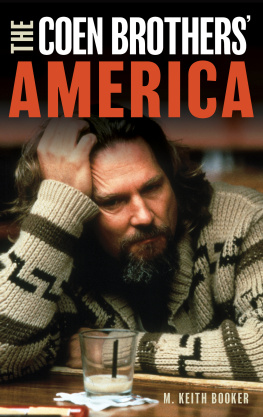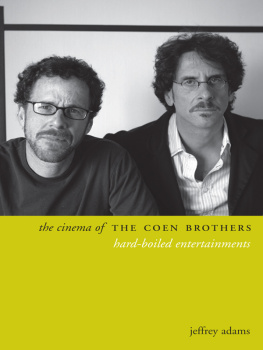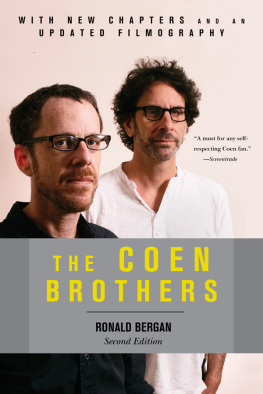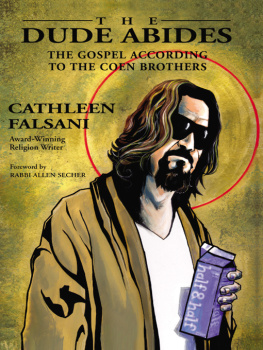Mark T. Conard - The Philosophy of the Coen Brothers
Here you can read online Mark T. Conard - The Philosophy of the Coen Brothers full text of the book (entire story) in english for free. Download pdf and epub, get meaning, cover and reviews about this ebook. year: 2009, publisher: ePubLibre, genre: Romance novel. Description of the work, (preface) as well as reviews are available. Best literature library LitArk.com created for fans of good reading and offers a wide selection of genres:
Romance novel
Science fiction
Adventure
Detective
Science
History
Home and family
Prose
Art
Politics
Computer
Non-fiction
Religion
Business
Children
Humor
Choose a favorite category and find really read worthwhile books. Enjoy immersion in the world of imagination, feel the emotions of the characters or learn something new for yourself, make an fascinating discovery.
- Book:The Philosophy of the Coen Brothers
- Author:
- Publisher:ePubLibre
- Genre:
- Year:2009
- Rating:3 / 5
- Favourites:Add to favourites
- Your mark:
- 60
- 1
- 2
- 3
- 4
- 5
The Philosophy of the Coen Brothers: summary, description and annotation
We offer to read an annotation, description, summary or preface (depends on what the author of the book "The Philosophy of the Coen Brothers" wrote himself). If you haven't found the necessary information about the book — write in the comments, we will try to find it.
The Philosophy of the Coen Brothers — read online for free the complete book (whole text) full work
Below is the text of the book, divided by pages. System saving the place of the last page read, allows you to conveniently read the book "The Philosophy of the Coen Brothers" online for free, without having to search again every time where you left off. Put a bookmark, and you can go to the page where you finished reading at any time.
Font size:
Interval:
Bookmark:
T HE P HILOSOPHY OF P OPULAR C ULTURE
The books published in the Philosophy of Popular Culture series will illuminate and explore philosophical themes and ideas that occur in popular culture. The goal of this series is to demonstrate how philosophical inquiry has been reinvigorated by increased scholarly interest in the intersection of popular culture and philosophy, as well as to explore through philosophical analysis beloved modes of entertainment, such as movies, TV shows, and music. Philosophical concepts will be made accessible to the general reader through examples in popular culture. This series seeks to publish both established and emerging scholars who will engage a major area of popular culture for philosophical interpretation and examine the philosophical underpinnings of its themes. Eschewing ephemeral trends of philosophical and cultural theory, authors will establish and elaborate on connections between traditional philosophical ideas from important thinkers and the ever-expanding world of popular culture.
Series Editor
Mark T. Conard,
Marymount Manhattan College, NY
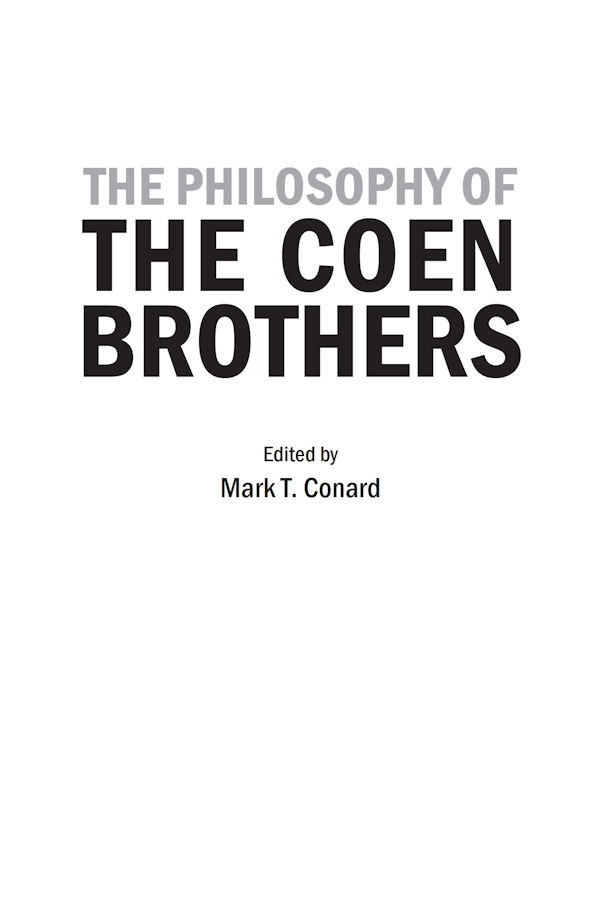
Mark T. Conard
Since arriving on the cinematic scene in 1984 with Blood Simple, Joel and Ethan Coen have amassed an impressive body of work that has garnered them critical acclaim and a devoted following. Their highly original works include both comedies and dramas and cover various genres (neo-noir, the romantic comedy, the western, the gangster film). However, most, if not all, of the Coens films defy exact categorization, and they always bear the brothers unmistakable stamp. From the Irish gangster morality play Millers Crossing (1990) to the film blanc Fargo (1996), from the neo-noir comedy The Big Lebowski (1998) to the Odyssean O Brother, Where Art Thou? (2000), the Coens never fail to have something interesting to say and always say it in a unique and entertaining fashion.
As Ive already hinted, much of the Coens work can be characterized as neo-noir, whatever other styles or genres the brothers are working in. For those unfamiliar with the term, film noir refers to a body of Hollywood films from the 1940s and 1950s that share certain visual features, such as stark contrasts between light and shadow and oblique camera angles meant to disorient the viewer, as well as particular themes, such as alienation, pessimism, and moral ambiguity. Classic noirs include The Maltese Falcon (John Huston, 1941), Double Indemnity (Billy Wilder, 1944), and Out of the Past (Jacques Tourneur, 1947). Any film coming after the classic period that displays these themes and has a similar feeling to it we refer to as neonoir. Later films, such as Chinatown (Roman Polanski, 1974), Body Heat (Lawrence Kasdan, 1981), and L.A. Confidential (Curtis Hanson, 1997), fall into this category, as do many of the Coens films. Blood Simple is a quite self-conscious neo-noir, for example, and The Man Who Wasnt There (2001) is clearly an homage to classic noir. As well see later, many or most of the brothers other movies can likewise be identified as noirs.
This work investigates the philosophical themes and underpinnings of the films of these master filmmakers and uses the movies as a vehicle for exploring and explicating traditional philosophical ideas. It comprises sixteen essays from scholars in both philosophy and film and media studies.
The essays are written in nontechnical language and require no knowledge of philosophy or media theory to appreciate or understand.
Part 1 of the volume, The Coen Brand of Comedy and Tragedy, begins with Richard Gilmores Raising Arizona as an American Comedy, in which he argues that the aspirations for improvement of the outlaw protagonist of the film, Hi McDunnough, are quintessentially American in nature. Next, in The Human Comedy Perpetuates Itself: Nihilism and Comedy in Coen Neo-Noir, Thomas S. Hibbs claims that the threat of nihilism, often prominent in classic noir, becomes a working assumption in much of neo-noir, revealing the various quests of the noir protagonist to be pointless, absurd, and thus comic and that the most representative examples of this turn to the comedic in noir are the films of the Coen brothers. In Philosophies of Comedy in O Brother, Where Art Thou? Douglas McFarland claims that the films comic underpinnings can best be understood through concepts of the mechanical, the contradictory, and the absurd articulated in Henri Bergsons Laughter and Sren Kierkegaards Concluding Unscientific Postscript. Richard Gilmore discusses the hubris and fatal flaws of Llewelyn Moss as he confronts his fate in the form of the killer Anton Chigurh in No Country for Old Men: The Coens Tragic Western. Last, in Deceit, Desire, and Dark Comedy: Postmodern Dead Ends in Blood Simple, Alan Woolfolk argues that the Coens first film has many of the classic noir conventions and themes but is at the same time thoroughly postmodern insofar as it frustrates the characters attempts to make sense out of their lives and to communicate with one another.
Part 2, Ethics: Shame, Justice, and Virtue, opens with And Its Such a Beautiful Day! Shame and Fargo, by Rebecca Hanrahan and David Stearns, in which they claim that the film can be read as a meditation on shame, insofar as the primary characters are repeatedly presented with the chance to look at themselves through the eyes of others. Shai Biderman and William J. Devlin, in Justice, Power, and Love: The Political Philosophy of Intolerable Cruelty, argue that the Coens tale of love, marriage, betrayal, and divorce can explain much about competing theories of justice within political philosophy. Ethics, Heart, and Violence in Millers Crossing, by Bradley L. Herling, avers that the brothers period noir is set in a gangster world run by an ethics of power that is enforced by violence but in which the primary characters at times display heart, or attachment to one another based on positive emotions and sympathy. Matthew K. Douglass and Jerry L. Walls, in Takin er Easy for All Us Sinners: Laziness as a Virtue in The Big Lebowski, examine the life philosophy of ber-slacker Jeffrey Lebowski, a.k.a. the Dude, and find that, especially in contrast to the hedonism, nihilism, and rugged individualism manifested in the other characters, the Dudes laziness is indeed a virtue. Last, Douglas McFarland, in No Country for Old Men as Moral Philosophy, discusses the ethical landscape of the Coens adaptation of the Cormac McCarthy novel set in a bleak and violent region of west Texas.
Part 3, Postmodernity, Interpretation, and the Construction of History, begins with my chapter Heidegger and the Problem of Interpretation in Barton Fink. In it I claim that the things and events in the life of the screen-writing protagonist lose their sense and meaning because he lives the life of the mind as an isolated Cartesian subject cut off from practical engagement with the world. Next, in The Past Is Now: History and The Hudsucker Proxy, Paul Coughlin discusses how the Coens in their meditations on the past dont simply allude to or recreate history; rather, they cinematically investigate how history as a narrative is constructed and question the ideologies underpinning that narrative. Last, Jerold J. Abrams, in A Homespun Murder Story: Film Noir and the Problem of Modernity in Fargo, argues that the Coen noir Fargo reveals the isolation and alienation of humanity within modernity and its social fragmentation and radical individuation.
Next pageFont size:
Interval:
Bookmark:
Similar books «The Philosophy of the Coen Brothers»
Look at similar books to The Philosophy of the Coen Brothers. We have selected literature similar in name and meaning in the hope of providing readers with more options to find new, interesting, not yet read works.
Discussion, reviews of the book The Philosophy of the Coen Brothers and just readers' own opinions. Leave your comments, write what you think about the work, its meaning or the main characters. Specify what exactly you liked and what you didn't like, and why you think so.

